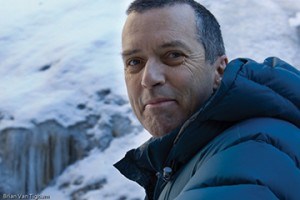
As a former superintendent of Banff National Park and an avid outdoorsman he has seen first hand the impact humans have had on AlbertaтАЩs landscape over the past 35 years.
To share his experience and thoughts he recently published Our Place: Changing the Nature of Alberta. The book is a collection of essays and articles inspired by his experience in the wilds of Alberta and the ways in which the province have often failed тАУ and sometimes succeeded тАУ at the challenge of sustaining the provinceтАЩs natural environment.
тАЬItтАЩs basically a compilation of almost a lifetimeтАЩs worth of writings,тАЭ said Van Tighem. тАЬWhen you put it together you end up with a historical picture.тАЭ
From the devastation of the Little Smokey watershed to the rescue and protection of the Whaleback region and Waterton front, his book explores AlbertaтАЩs stewardship failures, its conservation successes and offers suggestions for how Alberta could still get things right.
тАЬI went into the Little Smokey in 1988 with Carl Hunt who was the fisheries biologist at the time based out of Edson. I went in to help him tag Arctic grayling and when we went in the Little Smokey was pristine, there was one cut line leading into it that we went in on. It was an untracked boreal wilderness valley and it was just spectacular. IтАЩve never seen such a productive river,тАЭ recalled Van Tighem.
тАЬYouтАЩve seen the controversy more recently about the caribou issue and the wolf kill and thatтАЩs because in those subsequent years the place has been absolutely shredded by industry.тАЭ
He said that experience is just one example of the changes heтАЩs witnessed in his life time.
тАЬWhen you see that happening in just your adult life you realize that landscape change is huge in Alberta. We treat it as normal, but itтАЩs actually abnormal in terms of the rate of change.тАЭ
A common thread found throughout his book is the way that people talk about the landscape.
тАЬWe need to talk about nature and place differently than we do because the conversations we have lead to the decisions we make and weтАЩve been making some bad decisions.тАЭ
He pointed to the recent discussions about the mountain pine beetle, which is making its way eastward through Jasper National Park and the province.
тАЬEveryone thinks that mountain pine beetle is such a disaster. Mountain pine beetle is probably the best thing thatтАЩs ever happened to our eastern slope forests. ItтАЩs an essential way in which those forests are adapting to a changing climate, but because we have conversations that treat it as a disaster it leads us to do things which are actually harmful to those forests, which is salvage logging,тАЭ said Van Tighem.
тАЬFortunately in the national parks the pressure to salvage log has been really resisted because of the national parkтАЩs mandate, but elsewhere weтАЩve taken what was in fact a healthy process of forest change and turned it into just another way we strip the trees off the landscape.тАЭ
While his book takes aim at some of AlbertaтАЩs failures it also offers examples where the province got it right.
тАЬThe one that stands out for me is the protection of the Whaleback area in southern Alberta,тАЭ said Van Tighem. тАЬThe foothills in southwestern Alberta have huge real estate value because theyтАЩre scenic, theyтАЩre close to Calgary and thereтАЩs money to be spent on land so that whole landscape has been under threat for the last 20 or 30 years and ironically, considering he didnтАЩt do much for the environment, Ralph Klein did a couple of good things and one of them was to protect the Whaleback.тАЭ
According to Van Tighem, when he first wrote an essay about the Whaleback region there was no guarantee it was going to be protected, but by working with local ranchers and environmental organizations the provincial government turned it into a wildland park, protecting it from industrial development.
тАЬThe whole concept of a wildland park is an Alberta invention that says weтАЩre going to keep places protected, but not as national parks. WeтАЩre going to keep industry out and welcome people in so they still have hunting and they still have fishing.тАЭ
тАЬA lot of south western Alberta is protected now, either as public protected land or private land that has conservation agreements and thatтАЩs all happened in my life time so itтАЩs not all bad news. We can get things right here.тАЭ
Van Tighem will be in Jasper on April 27 to talk about his book Our Place: Changing the Nature of Alberta. The event begins at 6:30 p.m. and will be held at the Jasper Library and Cultural Centre. Prior to his book talk he will also be hosting a writing workshop with Habitat for the Arts from 3 p.m. to 4:30 p.m. The workshop is free for members otherwise thereтАЩs a $5 drop in fee.
тАЬMy life has flowed in out of Jasper every since university and in many way this book is a product of Jasper so itтАЩs particularly meaningful to bring it to a Jasper audience and share it with the community that helped me create it.тАЭ
Paul Clarke
[email protected]
